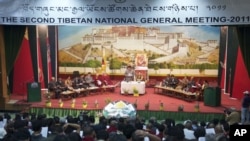Tibetan spiritual leader the Dalai Lama has categorically rejected a role as ceremonial head of state for the Tibetan exile administration in India. Tibetan leaders have been urging him to accept the role, two months after he abdicated his political duties and two months before a new Tibetan exile prime minister is scheduled to be inaugurated.
From virtually every corner of the world, members of the Tibetan exile parliament convened in Dharamsala, India to make a plea to their spiritual leader, the Dalai Lama.
In a similar meeting in March, the Dalai Lama indicated he would step back from formal political duties he has fulfilled for half a century, to make room for democratically elected officials.
Tibetan lawmakers and other leaders hoped to convince him to retain a role as a ceremonial head of state, similar to that of the Queen of England.
The president of a Tibetan exile group in Italy, Kalsang Dolker, says the Dalai Lama flatly refused.
"He said he will never be the head of the state. And he did not accept our proposal," Kalsang said.
It is difficult to overstate the personal importance of the Dalai Lama to the Tibetan exile community. His exodus from China in 1956 to Dharamsala, India became the genesis of the community itself, with tens of thousands of Tibetans following in his footsteps.
In the decades since, he has set not only the tone for a non-violent struggle for an autonomous Tibetan homeland, but served as as the head of a government that cares for more than 130,000 Tibetans in India and around the world.
A Harvard legal scholar named Lobsang Sangay was elected as the Tibetan exile prime minister earlier this year, but few believe he can replace the Dalai Lama's global celebrity appeal anytime soon.
A member of the Tibetan exile parliament representing North America, Tenzing Chonden, says the Dalai Lama explained his rejection of the ceremonial head of state role.
"He felt that the Tibetan people need to stand on their own feet through democratically elected leadership," Tenzing said.
While many Tibetans understand the rationale of the leader they call "His Holiness," Tenzing says they are disappointed nonetheless.
"Everyone is very sad. The devotion and the reverence that we all have for His Holiness, as not just as our political leader, but also our spiritual leader," Tenzing said. "That connection certainly makes it very difficult for everyone, all Tibetans, inside Tibet and outside, to accept this decision that his holiness has come to."
The Dalai Lama has long stated his goal to delegate his political powers to democratically elected officials. Part of that may have to do with the fact that he is 76 years old, and may not be around as long as his followers may like.





